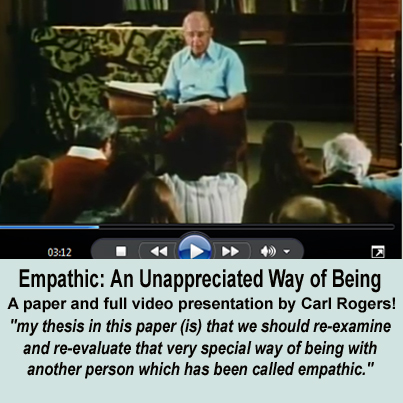|
|
Carl Rogers Empathy
Quotes
(To Carl Rogers Page 1)
“I and my colleagues realized that this empathic listening provided one
of the least clouded windows into the workings of the human psyche, in
all its complex mystery” (Rogers, 1974/1980b, p. 50)
“The state of empathy, or being empathic, is to perceive the internal
frame of reference of another with accuracy and with the emotional
components and meanings which pertain thereto as if one were the
person” (Carl Rogers 1980 P140).
"To my mind, empathy is in itself a healing agent. It is one of the most
potent aspects of therapy, because it releases, it confirms, it brings
even the most frightened client into the human race. If a person is
understood, he or she belongs." ~ Carl Rogers
'Empathy is the listener's effort to hear the other person
deeply, accurately, and non-judgmentally. Empathy involves skillful
reflective listening that clarifies and amplifies the person’s own
experiencing and meaning, without imposing the listener’s own material.'
~ Carl Rogers (1951)
|
 |
"Over the years, however, the research evidence keeps piling up,
and it points strongly to the conclusion that a high degree of
empathy in a relationship is possibly the most potent and
certainly one of the most potent factors in bringing about
change and learning. "
Carl
Rogers
Empathic:
An Unappreciated Way of Being |
|
 |
"The third facilitative aspect of the relationship is empathic
understanding. This means that the therapist senses accurately
the feelings and personal meanings that the client is
experiencing and communicates this understanding to the client.
When functioning best, the therapist is so much inside the
private world of the other that he or she can clarify not only
the meanings of which the client is aware but even those just
below the level of awareness. This
kind of sensitive, active listening is exceedingly rare in our
lives.
We think we listen, but very rarely do we listen with real
understanding, true empathy. Yet listening, of this very
special kind, is one of the most potent forces for change that
I know."
Carl
Rogers
Empathic:
An Unappreciated Way of Being |
|
 |
"An empathic way of being can be learned from empathic persons.
Perhaps the most important statement of all is that the ability
to be accurately empathic is something which can be developed by
training.
Therapists, parents and teachers can be helped to become
empathic. This is especially likely to occur if their teachers
and supervisors are themselves individuals of sensitive
understanding.
It is most encouraging to know that this subtle, elusive quality,
of utmost importance in therapy, is not something one is "born
with", but can be learned, and learned most rapidly in an empathic
climate. "
Carl
Rogers
Empathic:
An Unappreciated Way of Being |
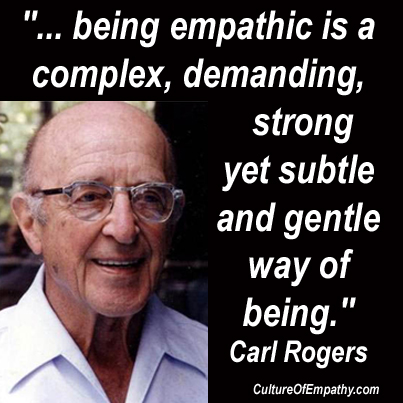 |
"Being
empathic means: "To be with another in this way means that for
the time being you lay aside the views and values you hold for
yourself in order to enter another's world without prejudice.
In some sense it means that you lay aside your self and this can
only be done by a person who is secure enough in himself that he
knows he will not get lost in what may turn out to be the
strange or bizarre world of the other, and can comfortably
return to his own world when he wishes.
Perhaps this description makes clear that
being empathic is a complex, demanding, strong yet subtle and
gentle way of being."
Carl
Rogers
Empathic:
An Unappreciated Way of Being |
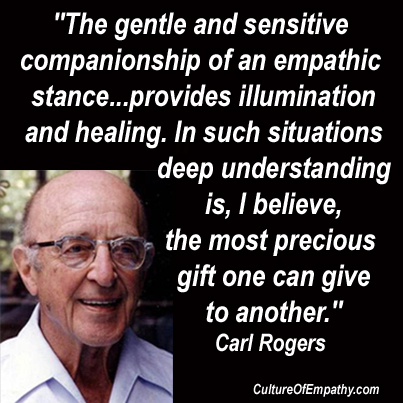 |
The gentle and sensitive companionship of an empathic stance
- accompanied of course by the other two attitudes -
provides illumination and healing. In such situations deep
understanding is, I believe, the most precious gift one can give
to another.
Carl
Rogers
Empathic:
An Unappreciated Way of Being
|
|
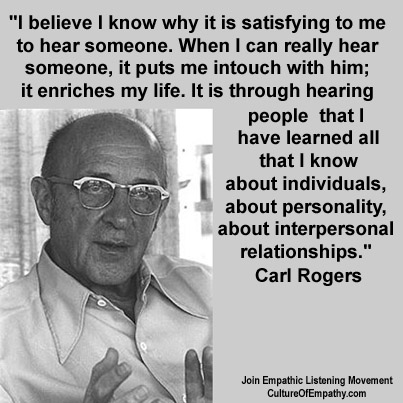 |
"I
believe I know why it is satisfying to me to hear someone. When I
can really hear someone, it puts me in touch with him; it enriches
my life.
It
is through hearing people that I have learned all that I know
about individuals, about personality, about interpersonal
relationships."
Carl
Rogers
Experiences in Communication
|
|
 |
" when
a person realizes he has been deeply heard, his eyes moisten. I
think in some real sense he is weeping for joy. It is as though he
were saying,
"Thank God, somebody heard me. Someone knows what it's like to be
me."
Carl
Rogers
Experiences in Communication
|
 |
"When someone really hears you without passing judgment on you,
without trying to take responsibility for you, without trying to
mold you, it feels damn good. . .
.
When
I have been listened to and when I have been heard, I am able to
re-perceive my world in a new way and to go on. It is astonishing
how elements which seem insoluble become soluble when someone
listens.
How confusions which seem irremediable turn into relatively clear
flowing streams when one is heard. "
Carl
Rogers
Experiences in Communication
|
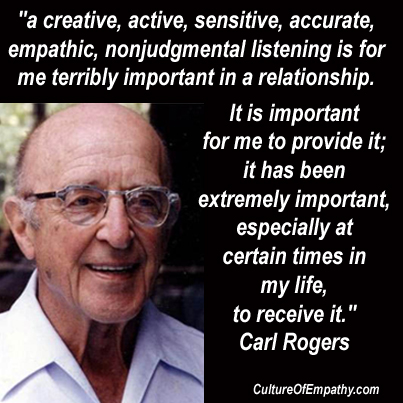 |
"So, as you can readily see from what I have said thus far, a
creative, active, sensitive, accurate, empathic, nonjudgmental
listening is for me terribly important in a relationship. It is
important for me to provide it; it has been extremely important,
especially at certain times in my life, to receive it.
I feel that I have grown within myself when I have provided it;
I am very sure that I have grown and been released and enhanced
when I have received this kind of listening. "
Carl
Rogers
Experiences
in Communication
|
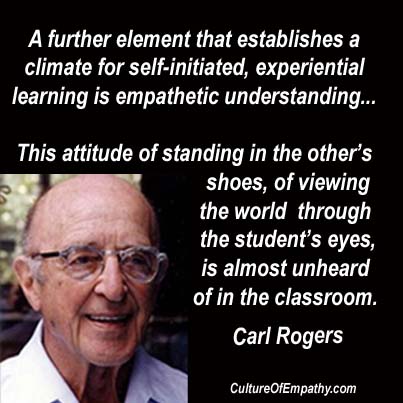 |
"A
further element that establishes a climate for self-initiated,
experiential learning is empathetic understanding.
When the teacher has the ability to understand the student’s
reactions from the inside, has a sensitive awareness of the way
the process of education and learning seems to the student, then
again the likelihood of significant learning is increased.
Carl
Rogers
Freedom to Learn,
pp. 126-127. |
|
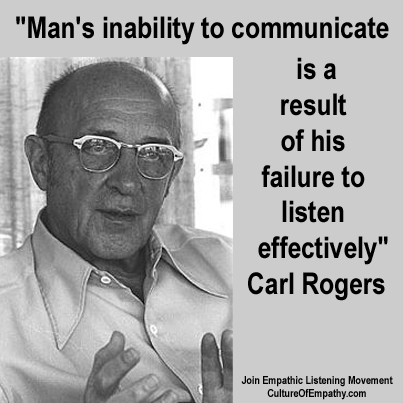 |
"Man's inability to communicate is a result of his failure to
listen effectively."
Carl
Rogers
|
 |
"The curious paradox is that when I accept myself just
as I am, then I can change."
Carl
Rogers
|
|
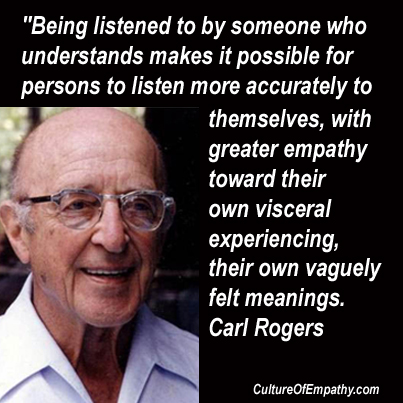 |
"Being listened to by someone who understands makes it
possible for persons to listen more accurately to themselves,
with greater empathy toward their own visceral experiencing,
their own vaguely felt meanings."
Carl
Rogers
|
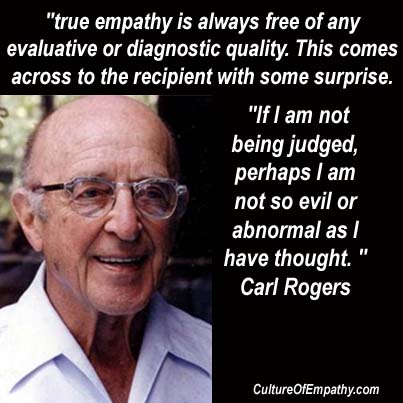 |
"true empathy is always free of any evaluative or diagnostic
quality. This comes across to the recipient with some
surprise. "If I am not being judged, perhaps I am not so evil
or abnormal as I have thought. "
Carl
Rogers
|
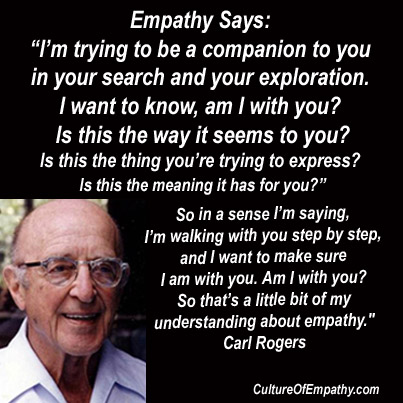 |
Empathy is saying
to someone:
“I’m trying to be a companion to you in your search and your
exploration.
I want to know, am I with you?
Is this the way it seems to you?
Is this the thing you’re trying to express?
Is this the meaning it has for you?”
So in a sense I’m saying,
“I’m walking with you step by step, and I want to make sure I am
with you.
Am I with you?”
So that’s a little bit of my understanding about empathy."
Carl
Rogers
|
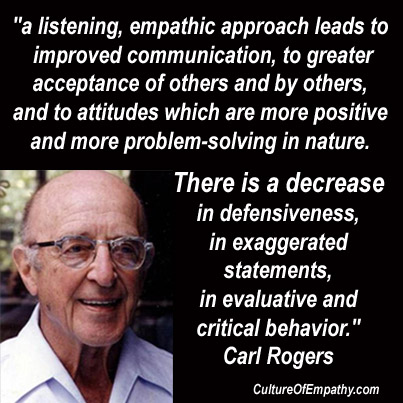 |
"a listening, empathic approach leads
to improved communication,
to greater acceptance of others and by others, and
to attitudes which are more positive and more problem-solving
in nature.
There is a decrease
in defensiveness,
in exaggerated statements,
in evaluative and critical behavior."
Carl
Rogers
|
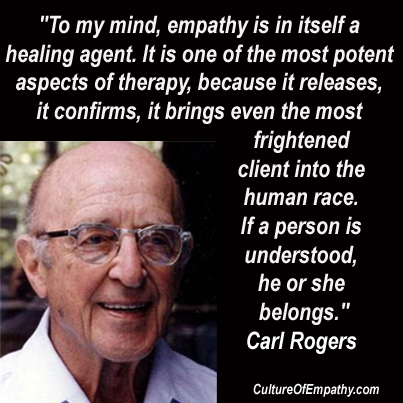 |
"To my mind,
empathy is in itself a healing agent. It is one of the most
potent aspects of therapy, because it releases, it confirms,
it brings even the most frightened client into the human
race. If a person is understood, he or she belongs."
(Rogers, 1986 |
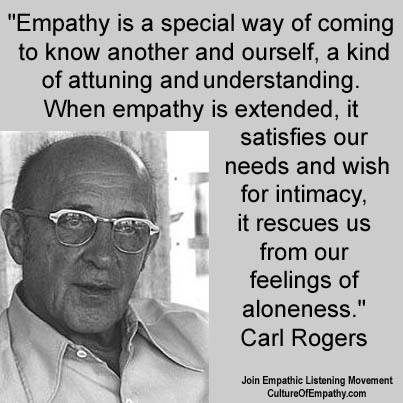 |
Empathy is a special way of coming to know another and
ourself, a kind of attuning and understanding. When empathy
is extended, it satisfies our needs and wish for intimacy,
it rescues us from our feelings of aloneness." Carl
Rogers |
 |
"People are
just as wonderful as sunsets if you let them be. When I
look at a sunset, I don't find myself saying, "Soften the
orange a bit on the right hand corner." I don't try to
control a sunset. I watch with awe as it unfolds."
Carl Rogers |
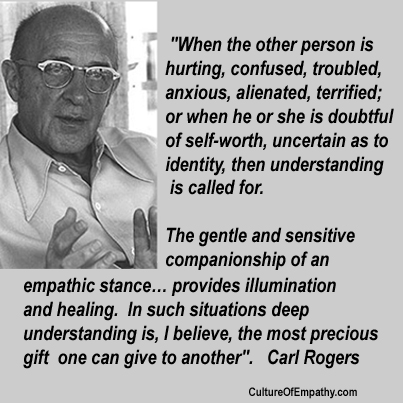 |
"When the other person is hurting, confused, troubled,
anxious, alienated, terrified; or when he or she is
doubtful of self-worth, uncertain as to identity, then
understanding is called for.
The gentle and sensitive companionship of an empathic
stance… provides illumination and healing. In such
situations deep understanding is, I believe, the most
precious gift one can give to another."
― Carl R. Rogers |
|






















